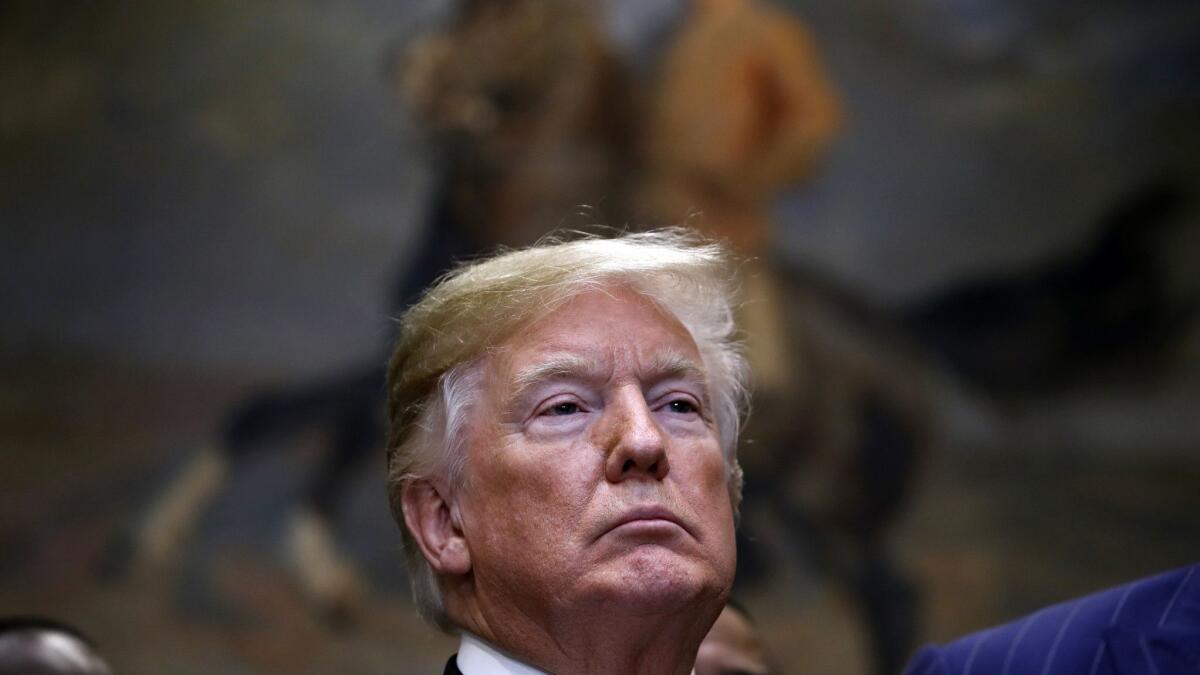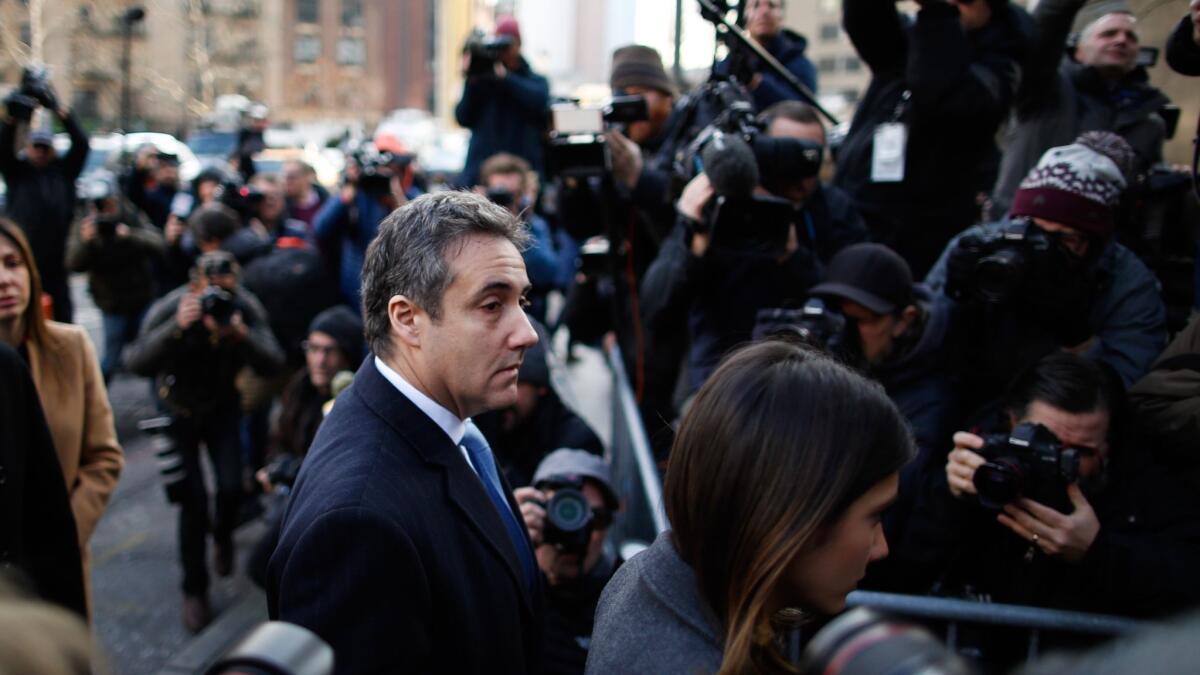Must Reads: Trump increasingly isolated as aides leave, friends flip and investigations advance

- Share via
Reporting from Washington — It was almost noon Friday when a Marine suddenly appeared outside the West Wing doors, a sign that President Trump had belatedly reported to the Oval Office.
For the third day in a row, the president had been in the White House residence all morning, fuming about federal investigations that have moved closer to him — and are likely to get worse.
His former confidant, attorney Michael Cohen, and other once-stalwart supporters have flipped, becoming witnesses for a Justice Department he has struggled to bend to his will. Prosecutors also secured the cooperation of American Media Inc., the tabloid publisher that routinely helped Trump muzzle bad stories and target his enemies.
The result is Trump has become increasingly isolated as he enters what may be the most difficult stretch of his presidency, one laden with political and legal dangers.
Trump’s first choice for a new chief of staff turned him down last week. Then one potential candidate after another publicly took himself out of the running. On Friday, after several days of confusion, Trump named Mick Mulvaney, director of the Office of Management and Budget, as his acting chief of staff.
Come January, a newly elected Democratic majority in the House is expected to issue a blizzard of subpoenas. Nancy Pelosi, who is expected to be the next House speaker, said on Thursday that a House committee will probably “take the first steps” toward seeking Trump’s long-hidden tax returns, an effort he will almost certainly fight.
Trump’s lawyer, Rudolph W. Giuliani, was spotted in Bahrain trying to drum up business for his private security company even as the incoming state attorney general in New York vowed to investigate Trump’s family business empire. Special counsel Robert S. Mueller III continues to investigate Russia’s role in Trump’s election and whether the president sought to obstruct justice by trying to end the inquiry.
“I don’t think he’s ever in his life been in this position,” said Barbara Res, who worked years for the Trump Organization, the president’s private family-run business. “He’s always had all the power and nobody else does.”
Follow the latest news of the Trump administration on Essential Washington »
Trump already is struggling to exert his influence. Few Republicans have endorsed his threats to force a government shutdown over Christmas if Congress doesn’t approve $5 billion for a proposed border wall.
On Thursday, the Republican-controlled Senate took a direct slap at the White House, voting unanimously by voice vote to condemn Saudi Crown Prince Mohammed bin Salman for the brutal slaying of journalist Jamal Khashoggi. Trump has publicly backed the crown prince despite U.S. intelligence findings that he masterminded the killing.
Newt Gingrich, a former House speaker who visited the White House on Wednesday, said Trump is digging in for trench warfare with his political and legal enemies.
“All this stuff is painful, but he’s a guy who’s been in lots of fights,” he said. “He sort of wishes it would go away and is prepared to fight it out if he has to.”
Tony Schwartz, the ghost writer of Trump’s 1987 bestselling book, “The Art of the Deal,” said the reckoning Trump faces follows decades of operating under a belief that he was above the law.
“He got away with so much, for so long, that he came to believe he was untouchable and invincible,” Schwartz said.
He said Trump followed the tactics he learned from his late mentor, the hard-knuckled New York lawyer Roy Cohn — “Lie about everything, attack back twice as hard as you’ve been hit, keep at it relentlessly until people finally give up and [they] stop arguing with your fabricated reality.”
“Trump is still living in that reality, but the world isn’t going along with him anymore,” he added.
Several others close to the president, granted anonymity to speak openly about conversations with him, said Trump already senses diminishing respect and worries about losing support from powerful financial donors and Republican lawmakers as his legal and political troubles worsen.
“They’re still not saying it publicly, but most Republicans on the Hill understand ... that it’s not going to end well, that it’s going to be bad,” said a longtime Republican operative close to party leadership.
Trump has long railed against “rats” who cooperate with law enforcement, and he repeatedly lashes out at former aides who’ve done just that.

In a Twitter message Thursday, he accused Cohen — who was sentenced to three years in federal prison the day before for tax fraud, campaign finance violations and other crimes — of pleading guilty “in order to embarrass the president and get a much reduced prison sentence, which he did.”
James Trusty, a former chief of the Justice Department’s organized crime section and a Washington-based partner at Ifrah Law, said persuading loyalists to turn on compatriots is key to any complex investigation.
“The Mafia had the omerta code of silence, but you still had people who were turncoats,” he said.
Trump’s orbit is “much softer,” he added. “We’re talking about businessmen and lawyers and folks who have families, and aren’t exactly hardcore when it comes to facing jail time.”
Perhaps the most pressing threat is the investigation, led by the U.S. attorney’s office in Manhattan, of what prosecutors say was an illegal scheme to pay $280,000 to two women shortly before the 2016 election to buy their silence about alleged sexual affairs with Trump years earlier.
Cohen directly paid Stormy Daniels, a porn star, and was reimbursed by the Trump Organization. American Media Inc., publisher of the National Enquirer, paid Karen McDougal, a former Playboy model, for the rights to her story and then never ran it.
Prosecutors say Trump directed both payments, which were illegal because they were intended to influence the election and functioned as excessive campaign contributions that were not disclosed.
In an interview aired by ABC’s “Good Morning America” on Friday, Cohen said Trump “of course” knew the payment was wrong.
“Nothing at the Trump Organization was ever done unless it was run through Mr. Trump,” he said.
Establishing whether Trump knew the hush money would violate campaign finance laws is a key hurdle for prosecutors if they intend to charge him.
The president once denied knowing about the payments, but he abandoned that as evidence showed otherwise. He now argues that he never asked Cohen to break the law.
“I never directed him to do anything wrong,” the president told Fox News on Thursday. “Whatever he did, he did on his own.”
Both Cohen and American Media, as well as federal prosecutors, say that the hush money payments were intended to boost the Republican nominee’s chances by suppressing the women’s claims of extramarital affairs with him.
According to court documents, the American Media chairman, David Pecker, offered in August 2015 “to help deal with negative stories about [Trump’s] relationships with women, assisting the campaign … so they could be purchased and their publication avoided.”
Some of Trump’s Republican allies have begun to publicly admit concerns about whether Trump violated the law in the hush money scheme — even if he’s unlikely to face prosecution while in office.
“Am I concerned that the president might be involved in a crime? Of course,” Sen. Bill Cassidy (R-La.) told reporters, although he also expressed doubt about whether the violation amounts to a crime.
There are more signs of trouble ahead. Trump was embarrassed after a combative Oval Office meeting on live TV on Tuesday with Pelosi and Senate Minority Leader Charles E. Schumer. Both Democrats challenged the president to his face, describing his policies and claims of political victories as fantastical.
With the White House chief of staff, John F. Kelly, leaving at the end of the year, Trump has struggled to find a permanent replacement.
After Nick Ayers, a top aide to Vice President Mike Pence, turned him down, several others reportedly under consideration — including former New Jersey Gov. Chris Christie, Rep. Mark Meadows (R-N.C.), Treasury Secretary Steven T. Mnuchin and New York Yankees President Randy Levine — also said no thanks.
David Bossie, a longtime Republican political warrior who was Trump’s deputy campaign chairman, was touted as a potential candidate. Some people close to Trump urged him to consider a White House political advisor, Johnny DeStefano.
On Friday, Trump tweeted that Mulvaney, his budget director, would become acting chief of staff. It’s unclear if that will end the turmoil, or if the president is putting Mulvaney in the job only on a temporary basis.
Trump, who has bristled at media reports that no one wants the job, contended Thursday that he is interviewing five “terrific people.”
While his difficulty filling the job highlights the president’s isolation, Schwartz, Trump’s ghost writer, said Trump almost certainly doesn’t agree.
“He doesn’t feel the ordinary human emotions most of us do,” he said. “For example, he’s free of shame because he has no conscience, nor any self-awareness. So while his behavior certainly suggests he feels increasing fear and isolation, he would be the last one to know it.”
Twitter: @chrismegerian
More to Read
Get the L.A. Times Politics newsletter
Deeply reported insights into legislation, politics and policy from Sacramento, Washington and beyond. In your inbox twice per week.
You may occasionally receive promotional content from the Los Angeles Times.












